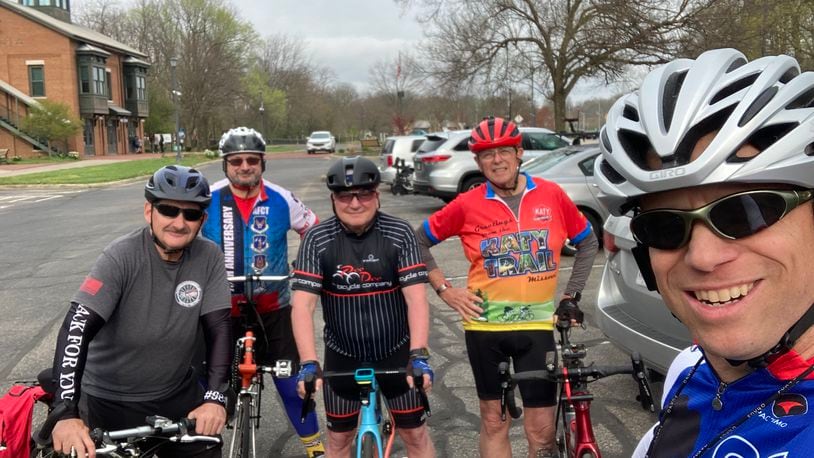“The program itself is really designed for what we call injured heroes,” Traub said. “It’s not just veterans or those who are active duty, and it’s also first responders. How is it that we can help you and your goals with health and fitness?”
Founded in 2008, Project Hero is a national organization helping veterans and first responders affected by Post Traumatic Stress Disorder, traumatic brain injuries, and other injuries. The goal is for veterans to achieve rehabilitation, recovery, and resilience in their daily lives, as well as increasing awareness about veteran and first responder mental health issues, according to the organization.
Project Hero has about 10 “hubs” nationally, which is the community-based portion where vets and first responders ride bikes, raise money, and engage socially with other veterans and community members.
“I call it like a support group on wheels,” Traub said. “A lot of times, veterans fall on hard times where they lose their job, or they’re on a ton of medication for anti-depression and injuries that they have. And our goal is to get them off the couch and reconnect them with their brothers and sisters.”
Traub sought out Project Hero the year after he retired from the Air Force in 2015, working as a defense contractor at the time.
“I was in a bad place myself,” he said. “I felt good giving back, but I thought there’s more to life than just doing stuff on computers and putting together software.”
Project Hero programs include national and regional Ride 2 Recovery events, and the organization also builds and provides adaptive bikes to physically challenged and injured veterans and first responders. Participants report elimination of and decreases in use of prescription drugs of as much as 65 percent, greater injury recovery rates, improved sleep habits and overall improvement in daily life, according to the organization.
Project Hero riders will be organizing teams to participate in Celebrate Trails Day in Yellow Springs and Ride To Work Day with Dayton Metroparks, as well as Ohio Honor Ride in May and the Great Lakes Challenge in August.
Traub’s own experience doing the weeklong Great Lakes Challenge was another reason he chose to start the Xenia Hub, after attempting the ride eight months after open heart surgery.
“I didn’t do well on the first day, let’s just call it that. I had an accident and I really struggled in my mind of, hey, what am I doing here?” he said. “They wrapped their arms around me and they said ‘Look, get back on the bike when you’re comfortable.’ And they got me back out there and I finished the whole ride.”
The mission of the Xenia Hub is to provide hope, recovery, and resilience to military and first responders in the Miami Valley, Traub said, specifically to reduce the “appalling statistic” of 22 veterans per day taking their own lives.
“We strive to get them off of pain medications and antidepressants and onto bicycles, where they can increase endorphins through the transformative mental and physical benefits of cycling,” Traub said.
Project Hero Xenia Hub’s goals for 2024 include holding weekly therapy rides from March to October, at the Xenia Station Bike Hub at 150 S. Miami Ave. Short rides are Tuesday nights at 5:15 p.m., longer rides are Saturday mornings at 10:15 a.m. Other goals are to raise funds to support local, regional, and national programs, and build relationships with local businesses.
Project Hero also founded the Institute for Mental Health in 2016 to support clinical research programs, which have helped more than 10,000 veterans and first responders since 2008, according to the organization.
About the Author
